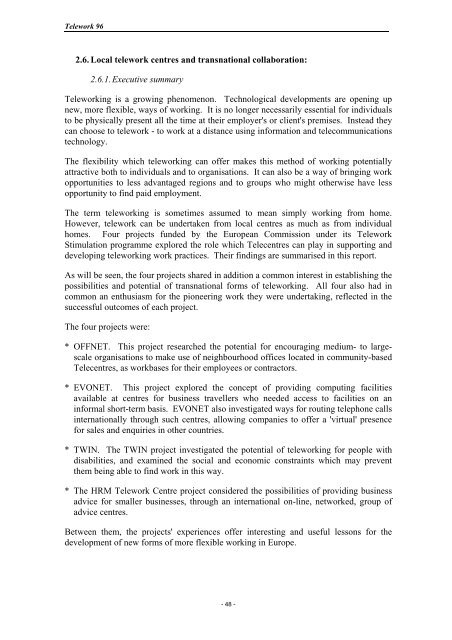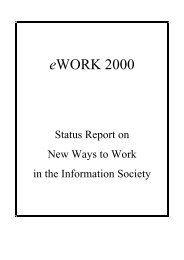1996 - European Telework Week
1996 - European Telework Week
1996 - European Telework Week
- No tags were found...
Create successful ePaper yourself
Turn your PDF publications into a flip-book with our unique Google optimized e-Paper software.
<strong>Telework</strong> 96<br />
2.6. Local telework centres and transnational collaboration:<br />
2.6.1. Executive summary<br />
<strong>Telework</strong>ing is a growing phenomenon. Technological developments are opening up<br />
new, more flexible, ways of working. It is no longer necessarily essential for individuals<br />
to be physically present all the time at their employer's or client's premises. Instead they<br />
can choose to telework - to work at a distance using information and telecommunications<br />
technology.<br />
The flexibility which teleworking can offer makes this method of working potentially<br />
attractive both to individuals and to organisations. It can also be a way of bringing work<br />
opportunities to less advantaged regions and to groups who might otherwise have less<br />
opportunity to find paid employment.<br />
The term teleworking is sometimes assumed to mean simply working from home.<br />
However, telework can be undertaken from local centres as much as from individual<br />
homes. Four projects funded by the <strong>European</strong> Commission under its <strong>Telework</strong><br />
Stimulation programme explored the role which Telecentres can play in supporting and<br />
developing teleworking work practices. Their findings are summarised in this report.<br />
As will be seen, the four projects shared in addition a common interest in establishing the<br />
possibilities and potential of transnational forms of teleworking. All four also had in<br />
common an enthusiasm for the pioneering work they were undertaking, reflected in the<br />
successful outcomes of each project.<br />
The four projects were:<br />
* OFFNET. This project researched the potential for encouraging medium- to largescale<br />
organisations to make use of neighbourhood offices located in community-based<br />
Telecentres, as workbases for their employees or contractors.<br />
* EVONET. This project explored the concept of providing computing facilities<br />
available at centres for business travellers who needed access to facilities on an<br />
informal short-term basis. EVONET also investigated ways for routing telephone calls<br />
internationally through such centres, allowing companies to offer a 'virtual' presence<br />
for sales and enquiries in other countries.<br />
* TWIN. The TWIN project investigated the potential of teleworking for people with<br />
disabilities, and examined the social and economic constraints which may prevent<br />
them being able to find work in this way.<br />
* The HRM <strong>Telework</strong> Centre project considered the possibilities of providing business<br />
advice for smaller businesses, through an international on-line, networked, group of<br />
advice centres.<br />
Between them, the projects' experiences offer interesting and useful lessons for the<br />
development of new forms of more flexible working in Europe.<br />
- 48 -








